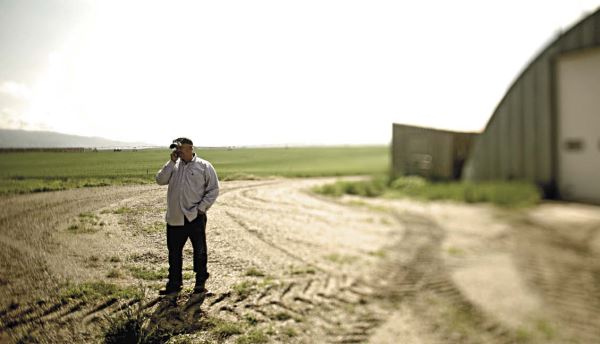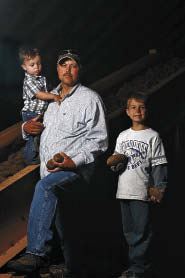 Is Russell Schwendiman of Ririe, Idaho, a new type of grower? Most growers take their father's farm and expand that operation, but Russell didn't follow that pattern.
Is Russell Schwendiman of Ririe, Idaho, a new type of grower? Most growers take their father's farm and expand that operation, but Russell didn't follow that pattern.
Russell was raised on a farm in Newdale, Idaho, but now farms in Ririe, which is about 50 miles away. When Russell came to Ririe, he had to buy the land, and, I thought, equipment. One of the farms Russell purchased was the farm I worked on, so I was excited to talk to Russell about what type of grower he is and also, for my own benefit, to see what he has done to the farm I had spent a lot of time on.
Russell rented some farm ground from his dad when he was a freshman in high school while involved in FFA and continued that for the four years he was in high school. After a two-year church mission, he came home and purchased 80 acres from a relative, farmed the 89 acres and rented out other ground with it. He wanted to expand, but there wasn't much ground available in Newdale, so he started to look around. He soon found a farm for sale in Ririe.
That is where I got to know Russell. He bought the farm next to ours, which consisted of 1,000 irrigated acres. The next couple of years he purchased or rented the farm on which I worked. That farm had 2,000 irrigated acres and some dry farm. Today he has 5,000 irrigated acres and 7,000 dry farm acres.
I asked how he was doing this. He gave me one three-word answer-"Keep it simple."
Because water is always a big topic in Idaho, Russell made two major changes: he first put all the ground he could under pivots. Previously, the irrigation was a 50-50 split between pivots and hand lines. Next he installed variable speed pumps, which regulate the pump as pressure varies. (See our feature on Golden West Irrigation in July's issue.)
Russell also added a lot of acres to irrigation, which presented a concern: where did he get the water, seeing how we took all our water from the aquifer, and those water rights are in the courts in Idaho? He simply bought some water rights and pumps it out of the canal. I could tell he had thought long and hard how to make the water work, and had tied the systems together to keep it simple.
Russell says his average yield is 400 cwt to the acre, which blew me away. When we farmed that ground, we averaged 250. If we got 300 cwt, we thought it was a phenomenal job. I asked "How?" He says it is a combination of two factors: growing them on ground newly converted to irrigation and using biological fertilizer. I asked how often he dams and dikes. He said once. (We did it twice.) Another big difference is that Russell harvests 60 percent No. 1s, while we had about 40 percent.
The varieties he grows are Russet Norkotas, Rangers and Burbanks, making up 750 acres. He harvests with one four-row combine and two four-row crossovers, and allows two to three weeks to harvest. The potatoes come in very clean, so the only machinery he has in the storage is one piler. He runs two pilers in two storages during harvest.
When he says to keep it simple, he means it.
 Also to keep it simple, he purchased part of a warehouse, along with four other growers to supply all the potatoes the warehouse needs. They ship potatoes to the warehouse according to how they are storing.
Also to keep it simple, he purchased part of a warehouse, along with four other growers to supply all the potatoes the warehouse needs. They ship potatoes to the warehouse according to how they are storing.
Russell says that wheat is his cash crop-he grows potatoes for a good rotation. This was something else that was different. We did a three-year rotation because potato pricing was so volatile. We grew potatoes for the money. Russell says that wheat is steadier and less volatile.
Russell attends the annual Ag Expo in Pocatello, but says he has learned that spending time in the field thinking of new ideas while he is driving equipment is the best schooling you can have.
Purchasing land and equipment you're not inheriting is no small investment, but Russell works beside his two boys, Dan and Jack.
Isn't this what makes growing worth it? You spend quality time with those that mean the most to you, you get to pass on a little of yourself to these kids.